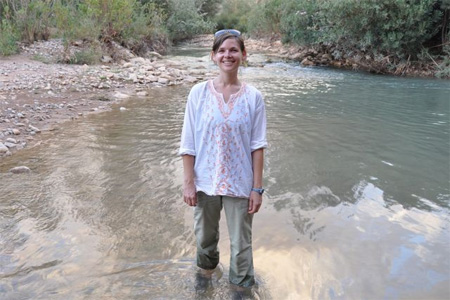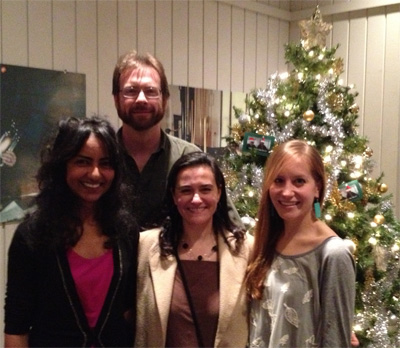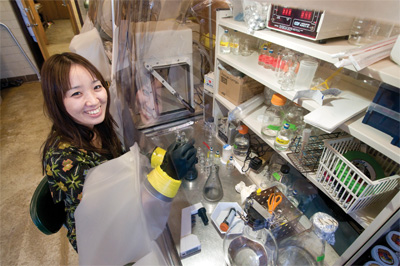Joint Brown University/MBL Graduate Program Awards Four Ph.D.s in 2012

FOR IMMEDIATE RELEASE: December 21, 2012
Contacts: Diana Kenney, Marine Biological Laboratory
508-289-7139 or 508-289-7423; dkenney@mbl.edu or comm@mbl.edu
David Orenstein, Brown University
401-863-1862; David_Orenstein@brown.edu
WOODS HOLE, Mass., and PROVIDENCE, R.I. — Three women successfully defended their Ph.D. dissertations in the Brown-MBL Partnership and Graduate Program in Biological and Environmental Sciences in the past month, joining a fourth who received her doctorate in May.
Graduate students in this joint program draw on the expertise of faculty mentors at Brown University and the Marine Biological Laboratory (MBL), and often conduct research in the MBL’s laboratories in Woods Hole or at MBL field sites in Alaska, Antarctica, the Amazon, Africa, North America, Panama, and other locales.
The new Ph.D.s are Shelby Riskin, Susanna Theroux, Anupriya Dutta and Yuko Hasegawa.
 Shelby Riskin performing field work in Brazil.
Shelby Riskin performing field work in Brazil.Shelby Riskin studied the impacts of intensive soybean agriculture on Amazonian soils and waterways, particularly the consequences of heavy use of phosphorus-based fertilizers. Riskin, who defended her thesis in May, conducted her research at Tanguro Ranch, a 200,000-acre soybean farm in Matto Grosso, central Brazil. Her research led to an upcoming article in Biosciences (January 2013) that compares the environmental impacts of phosphorus-based fertilizers in the world’s most productive soybean-growing regions: Iowa, Mato Grosso, and Buenos Aires, Argentina. Riskin’s Ph.D. advisors were Chris Neill, director of the Brown-MBL Partnership and Graduate Program and director of the MBL Ecosystems Center, and Stephen Porder of Brown’s Department of Ecology & Evolutionary Biology.
 From left: Anupriya Dutta, her MBL advisor David Mark Welch, Linda Amaral Zettler of the MBL, and her advisee Susanna Theroux
From left: Anupriya Dutta, her MBL advisor David Mark Welch, Linda Amaral Zettler of the MBL, and her advisee Susanna TherouxSusanna Theroux’s doctoral research identified novel species of algae that can be used to calculate the temperature of lake water going back into geological time. These algae, classified as haptophytes, produce alkenone lipids that function as organic “paleothermometers.” Theroux’s work combined field studies in Greenland and North Dakota, culture studies and DNA sequencing at the MBL, and organic analyses at Brown. She defended her thesis on Nov. 28, and in January she will be starting a postdoctoral fellowship at the Department of Energy’s Joint Genome Institute. Theroux’s Ph.D. advisors were Yongsong Huang of Brown’s Department of Geological Sciences and Linda Amaral-Zettler of the MBL’s Bay Paul Center.
Anupriya Dutta studied a remarkable animal lineage that has survived without sexual reproduction over the past 80 million years – the bdelloid rotifers. These microscopic animals can also live for years without water, going into a desiccated state, and can incorporate foreign DNA into their genomes during their dried-out phases. Dutta discovered that bdelloid rotifers have an unusual repertoire of microRNAs (miRNAs) that provides important clues to understanding their asexual evolution, as well as the evolution of miRNAs in animals. Dutta defended her dissertation on Dec. 5; her advisor was David Mark Welch of the MBL’s Bay Paul Center.
 Yuko Hasegawa in the MBL's Bay Paul Center. Photo by Tom Kleindinst
Yuko Hasegawa in the MBL's Bay Paul Center. Photo by Tom KleindinstYuko Hasegawa’s doctoral research focused on developing a new imaging technique to see how microbial communities are organized, particularly inside the body. Her technique allows one to distinguish up to 11 different types of microbes in one fluorescence image, which led her to investigate the spatial distributions of bacterial cells in the gut of mice that were inoculated with bacterial types typically found in the human gut. Hasegawa’s imaging protocols will be useful for characterizing spatial organization of microbial communities in many different types of environmental and clinical samples. Her co-advisors were Gary Borisy and Mitchell Sogin of the MBL’s Bay Paul Center; she defended her thesis on December 18.
The Brown-MBL Graduate Program attracts a diverse group of talented and dedicated students from around the world. Some students spend their first years taking courses at Brown and do not make their base at MBL full-time until their second or third year in the program. Other students remain based in Providence for the duration of their studies but work closely with one or more MBL scientists as they pursue their research. Still other students engage in research that requires them to be at the MBL from the start of their studies. Sixteen graduate students currently are enrolled in the program, ten students have graduated from the program with doctorates and four others have left early with a masters degree.
In addition, every summer, a number of Brown undergraduates receive awards to support summer internships in MBL labs in Woods Hole or field sites across the globe.
###
The Marine Biological Laboratory (MBL) is dedicated to scientific discovery and improving the human condition through research and education in biology, biomedicine, and environmental science. Founded in 1888 in Woods Hole, Massachusetts, the MBL is an independent, nonprofit corporation. A corps of more than 270 scientists and support personnel pursue research year-round at the MBL, joined each year by more than 400 visiting scientists, summer staff, and research associates from hundreds of institutions around the world. Among the scientists with a significant affiliation with the MBL are 55 Nobel Laureates (since 1929).
Founded in 1764, Brown University is the nation’s seventh-oldest institution of higher education and a member of the Ivy League. The University provides close mentoring of students and the vibrant engagement of a research-intensive university. Deeply committed to teaching and research, Brown faculty members view graduate and undergraduate students as vital members of their scholarly teams. Brown ranks among top global research universities, with $180 million in sponsored research awards for 2010.